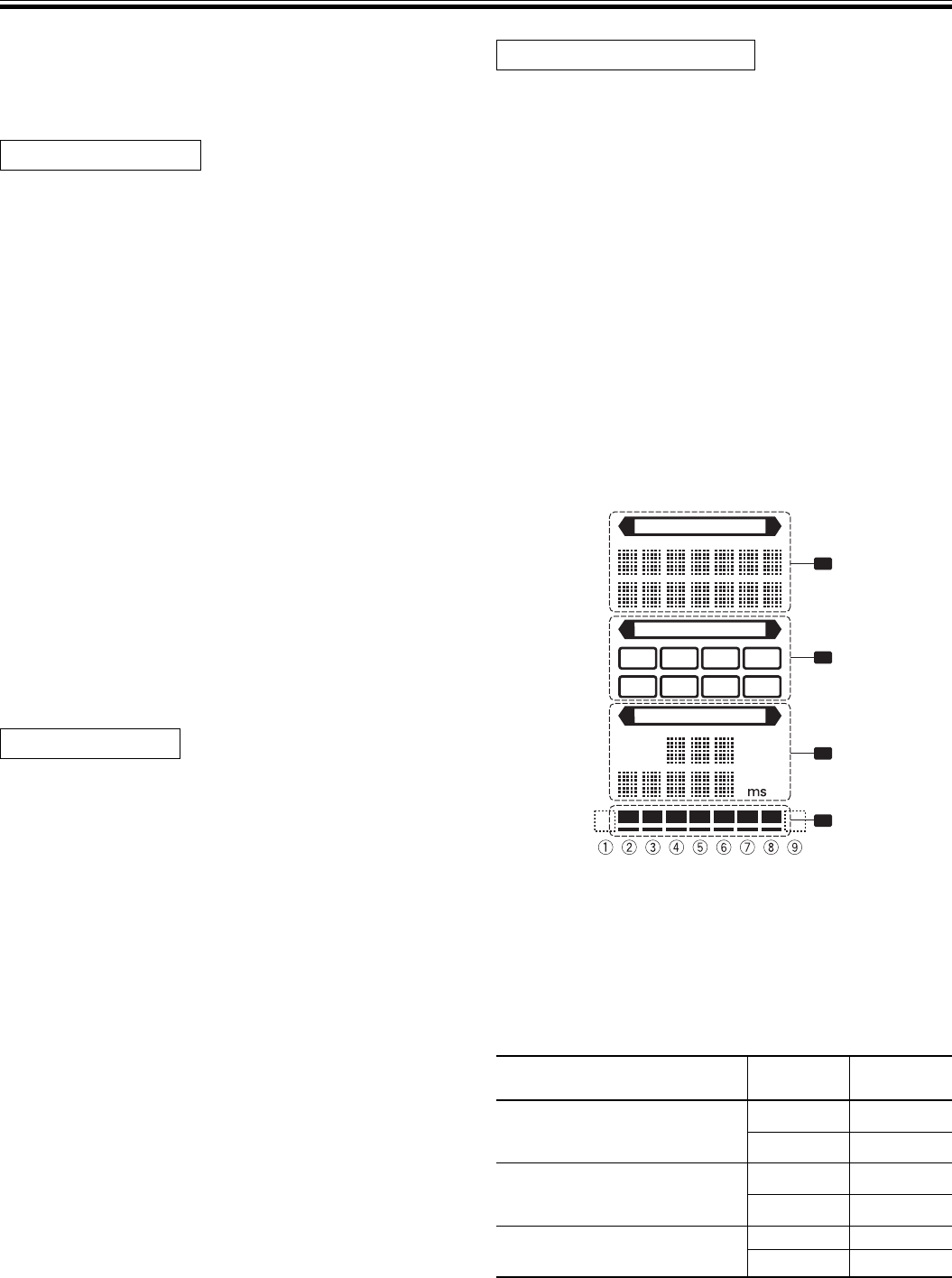
10
<DRB1392>
En
DISPLAY SECTION
EFFECT SELECT
CH SELECT
PARAMETER
1 2 3 4
MIC MST
AUTO
MIDI
TAP BPM
%
A B
1
2
3
4
1. Effects display section
The <EFFECT SELECT> indicator lights constantly, and the
alpha-numeric display (seven characters in two lines)
indicates the name of the effect as shown below. Also, when
one of the change operations is performed as noted in the
table, the corresponding characters are displayed for two
seconds, after which the display returns to the original effect
name.
30. Headphones level adjust dial (LEVEL)
Adjusts the output level of the headphones jack. (adjustable
range: –∞ to 0 dB)
31. Headphones jack (PHONES)
BPM counter section
32. Beat select buttons (2 BEAT 3)
3 (Beat up): Doubles the calculated BPM.
2 (Beat down): Halves the calculated BPM.
(P. 16)
¶ Some effects can be set for “3/4”.
33. MIDI start/stop button (MIDI START/STOP)
Use to alternate the MIDI control function between start and
stop (P. 19).
When this control is enabled, the [MIDI START (STOP)]
message appears for two seconds on the display.
MIDI SNAP SHOT:
When the MIDI START/STOP button is held depressed, a
snapshot is sent to the external MIDI component.
34. BPM measuring mode button (AUTO/TAP)
Each time the button is pressed, the BPM measuring mode
alternates between [AUTO] and [TAP].
AUTO:
The display’s [AUTO] indicator lights, and the BPM is
automatically calculated.
TAP:
The display’s [TAP] indicator lights, and the BPM is calculated
manually by TAP button input.
35. TAP button
The BPM is calculated from the intervals at which the TAP button
is struck. If the TAP button is pressed in the AUTO mode, the
mode automatically switches to the TAP mode (manual input).
Beat effect section
36. Effect selector (DELAY, ECHO, REV DLY (REVERSE
DELAY), PAN, TRANS, FILTER, FLANGER, PHASER,
REVERB, ROBOT (ROBOT VOCODER), CHORUS,
ROLL, REV ROLL (REVERSE ROLL), SND/RTN
(SEND/RETURN))
Use to select desired type of effect (P. 14).
When using an external effector connected to the SEND and
RETURN connectors, set to the [SND/RTN] position.
37. Effect channel selector (1, 2, 3, 4, MIC, CF.A, CF.B,
MASTER)
Use to select the channel to which effects are applied (P. 16).
When [MIC] is selected, effects are applied to both
microphone 1 and microphone 2.
38. Effect parameter 1 dial [TIME (PARAMETER 1)]
Adjusts time parameter for selected effect (P. 16, 18)
¶ If the TIME dial is rotated while depressing the TAP button,
direct BPM can be set manually.
¶ If the TIME dial is rotated while holding the TAP button and
AUTO/TAP buttons depressed, the BPM can be set in 0.1
units.
39. Effect parameter 2 dial
[LEVEL/DEPTH (PARAMETER 2)]
Adjusts quantitative parameters for selected effect (P. 16, 18).
40. Effect button/indicator (ON/OFF)
Sets selected effect ON/OFF (P. 16). Whenever power is first
turned ON, effects default to OFF and the button is lighted.
When effects are enabled (ON), the button flashes.
Sound-color effects section
41. Sound-color effect select buttons/indicators
(HARMONIC, SWEEP, FILTER, CRUSH)
Use to select and enable/disable sound-color effects (P. 17).
The button for the selected function will flash, and the effect
will be applied equally to channels 1 to 4. When the flashing
button is pressed, it lights steadily and the effect turns OFF.
When power is first turned on, all effects default to OFF
(indicators are lighted).
42. Harmonic Indicators
When [HARMONIC] is turned ON, these indicators light and
the color of the indicator changes in accord with the status of
the effect (P. 17).
43. Sound-color effect parameter dial (COLOR)
Used to adjust quantitative parameters for the effect selected
with the sound-color effect selector buttons (P. 17, 18)
44. Display
See P. 10 to 11 for details.
NAMES AND FUNCTIONS OF PARTS (OPERATION PANEL/DISPLAY SECTION)
Switching Operation
At MIDI start
At MIDI stop
MIDI snapshot
Upper/
Lower Row
Upper MIDI
Lower START
Upper MIDI
Lower STOP
Upper SNAP
Lower SHOT
Display


















